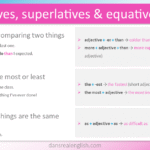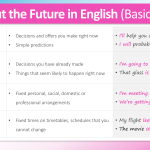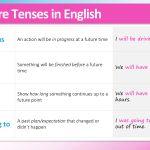Intensity modifiers in English
Do you know how to make words in English sound softer or stronger?
English speakers use modifiers like, “a bit”, “extremely” or “such” to change the strength of words they use. For example:
“That was such an amazing meal!”
Intensifying modifiers are useful because they let you exaggerate or soften the tone of what you want to say.
This free English grammar lesson will show you how to use intensity modifiers with verbs, nouns, adjectives and adverbs.
Understanding intensity modifiers
When do we use them?
We use these modifiers to change how strong or weak something sounds. They are common in everyday English and help us express emotion, emphasis, and exact meaning.
- To make something stronger: She’s absolutely certain.
- To make something softer: It’s a bit cold today.
- To exaggerate: That’s really, really funny!
What do they modify?
- Adjectives: – very tall, completely wrong
- Adverbs: – incredibly quickly, slightly awkwardly
- Verbs: – really love, totally forgot
- Nouns: – such a mess, a real problem
Different kinds of modifiers
Modifiers with Adjectives
Here are some common examples of intensity modifiers that form collocations with adjectives:
Structure: modifier + adjective
Example: She’s very tired.
| Modifier | Example Sentence |
|---|---|
| very | It’s very cold. |
| really | She’s really excited. |
| a little | It’s a little uncomfortable. |
| extremely | He’s extremely angry. |
| absolutely | That’s absolutely perfect. |
| a bit | It’s a bit noisy here. |
| quite | She’s quite kind. |
| super | He’s super helpful. |
| really, really | That was really really hard. |
| kind of | It’s kind of hard to say. |
| so | It’s so easy! |
| pretty | I’m pretty disappointed. |
Example Dialogue:
A: Is Julia coming to the party?
B: Yeah – she’s so excited.
A: She said it’s going to be super fun.
B: I’m only a bit interested, to be honest.
Modifiers with Adverbs
You can also use modifiers to weaken or strengthen adverbs:
Structure: modifier + adverb
Example: She runs incredibly fast.
| Modifier | Example Sentence |
| very | He speaks very clearly. |
| really | She answered really slowly. |
| incredibly | They responded incredibly well. |
| slightly | He moved slightly awkwardly. |
| somewhat | She hesitated somewhat nervously. |
| not really | I’m not really sure about that. |
Example Dialogue:
A: Did you hear what Jim was saying?
B: Yeah, but he talked incredibly fast, didn’t he?
A: I thought he explained things really clearly, actually.
Modifiers with comparative adjectives and adverbs
We can also use modifiers like much, way and so much when making comparisons between things.
A: That show is (so) much better than than the movie I saw last time.
B: Yeah, I agree. It’s way better, isn’t it?
A: My car goes so much faster now that I’ve changed the tyres.
B: Yeah, same here. Mine drives way more smoothly, as well.
More examples of comparative modifiers:
- much more interesting (than..)
- so much cheaper (than..)
- much less expensive (than..)
Modifiers with Verbs
We often use modifiers with verbs to exaggerate (or soften) how we feel about things:
Structure: modifier + verb (especially mental/emotional verbs)
Example: I really like this song.
| Modifier | Example Sentence |
| really | I really enjoy painting. |
| totally | They totally forgot. |
| absolutely | She absolutely loves cats. |
| kind of | I kind of agree with that. |
Example Dialogue:
A: Do you like that new show?
B: I totally love it.
A: me too. I really enjoy the story, but I think the effects are awful.
B: Yeah, I kind of agree. It’s a bit of a shame, really, isn’t it?
Modifiers with Nouns
Structure: determiner + modifier + noun
Example: It was such a mess.
| Modifier | Example Sentence |
| such | It was such a surprise! |
| what (a) | What an amazing view! |
| a real | That’s a real problem. |
| a complete | It’s a complete disaster. |
Example Dialogue:
A: What happened at work?
B: It was such a disaster!
A: Everything went wrong.
B: Sounds like a complete nightmare.
Common mistakes with modifiers
Avoid these common mistakes
| Incorrect modifier | Correction |
| very impossible | absolutely impossible |
| very extremely tired | extremely tired |
| super amazing report | very impressive report (formal) |
| a completely disaster | a complete disaster |
| such boring | It’s so boring / such a boring thing |
Exercises
Exercise 1: Complete the Sentence
1. He was furious when he found out the truth.
2. I enjoyed the movie — it had a great twist at the end.
3. She moved awkwardly after twisting her ankle.
4. That was mess — nothing worked!
5. I’m disappointed we couldn’t go.
6. He talks fast — I couldn’t catch anything.
Exercise 2: Correct the Mistake
1. That’s very impossible to fix.
2. It was a completely disaster from start to finish.
3. I think she’s very extremely talented.
4. That film was such boring I almost fell asleep.
5. She absolute loves classical music — she listens every day.
6. That was a totally nonsense! I didn’t understand a thing!
Your final score
Total: 0 / 0







